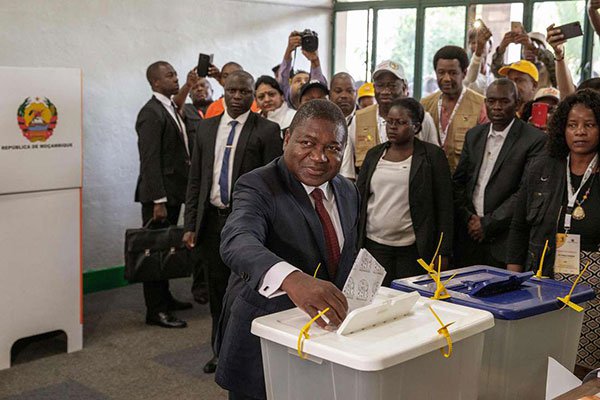An elections observer group in Mozambique says president Filipe Nyusi is heading for a landslide victory in elections, according to its preliminary estimates.
Based on data from almost 2,500 polling stations out of a total of more than 20,000, the Electoral Institute for Sustainable Democracy in Africa (EISA) estimates Nyusi will win 70.9% of the vote.
EISA programme officer Domingos Rosario said that during its count, the institute found that in many polling stations across seven different provinces, the number of votes greatly exceeded the number of voters registered at that station.
EISA estimates Momade will end up with around 21.4% of the vote while Daviz Simango, of smaller rival the Mozambique Democratic Movement, will secure 6.9%, Rosario told a news conference.
Official results from the electoral commission indicate that Nyusi has taken 74.6% of the presidential vote versus 20.2% for his main rival, Renamo candidate Momade, with two-thirds of polling stations processed.
Meanwhile, Mozambique’s main opposition party, Renamo on Monday called on citizens to reject the results that have so far been released by the electoral commission.
With around 37% of the votes counted from roughly 13 million registered voters, Nyusi of the ruling Frelimo party had secured 74.6%, while opposition Renamo candidate Osuffo Momade had 20.2%.
After a meeting of its top officials on Monday in Maputo, Renamo said it had decided to challenge the results over allegations of registration irregularities, phantom voters and the intimidation of activists and candidates by security forces.
“The above-mentioned facts … reported here constitute predicted and punishable electoral offences under the law, as well as a denial of the most elementary principles of democracy and human rights,” said Renamo president Momade.
“We urge all Mozambicans not to accept this mega electoral fraud.”
Frelimo spokesman Caifadine Manasse said Renamo regularly complains about elections, despite being part of all the electoral bodies and having delegates at voting stations.
“Renamo is not serious about democracy,” he said.
Victory for Renamo in a number of provinces is seen as central to the survival of a peace pact signed in August. But early data suggests Renamo has already lost some of them.
According to electoral commission data, Frelimo had clinched nearly 80% of the vote compared to Renamo’s 17% in Tete province. In nearby Sofala, site of Renamo’s headquarters, the opposition had only 20% versus Frelimo’s nearly 66% of votes.
Renamo hoped to win control of such provinces to satisfy a long-thwarted demand for influence: for the first time after the election, provincial governors will be appointed by the majority party in each province rather than by the government.
